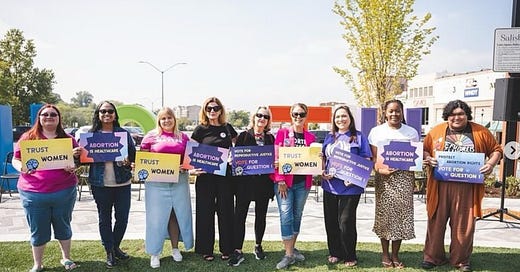Maryland activist reflects on ballot initiative’s success
While the amendment guarantees legal access, there are still financial hurdles as abortion funds have been stretched thin.
The backstory behind the ballot initiatives for abortion access will fascinate readers as much as the news of their victory did. Such is the case with Maryland’s recent successful effort to enshrine abortion rights within its state constitution.
Sharon Blugis, the founder of Reproductive Justice Maryland, which canvassed to gather support, spoke to me over the phone. Forty to 50 organizations had been part of a coordinated effort to galvanize voters to pass Amendment One as it was known. Hundreds of people partook in the activism.
Blugis started her organization two years ago, following the Dobbs decision. While organizations like Planned Parenthood paid for signage and placards, Reproductive Justice Maryland and other coalition members provided the boots on the ground.
“One of the more satisfying things was just driving across the state as I did and meeting all these different people who were so engaged and excited about Amendment One and giving them signs and dropping off (literature) and hugging necks, “ Blugis said. “And it was a ‘We're all in this together kind of thing.’”
Abortion was already legal in the state when the amendment passed, but reproductive rights leaders wanted to protect it with constitutional guarantees further.
Maryland is of vital importance to abortion access as it is one of the closest states to the South, which is essentially lacking any abortion access after the failure of the Florida ballot initiative effort and the antiabortion legal tactics that undermined the one in Arkansas.
The number of patients in Maryland who came for abortion care increased by 4,000 in 2023 and by the same amount again the following year. Abortion funds in Maryland that had been directing money to in-state residents before Dobbs instead began seeing their money go to out-of-state residents. That’s something I intend to explore in future newsletters–the financial impact of less money from abortion funds going to people living within their commonwealths because it went to women elsewhere.
In April, legislators in Maryland pushed a bill that would make abortion access more equitable and accessible in the state. Sen. Ariana B. Kelly sponsored legislation that would create additional funding for clinics across the state by making insurance carriers use built-up funds, which were collected for abortion care because of stipulations in the Affordable Care Act. Kelly found that nearly $90 million had been built up. The proposed law was known as the Abortion Care Access Grant Program, which empowered the state secretary of health to determine how the funds would be used in support of abortion clinics.
If the bill passed, the Maryland Insurance Commissioner would assess the dollar amount of those unspent funds from the prior year in the next. Insurers would have the opportunity to work with the Commissioner to verify the accuracy of the numbers. Then, the Insurance Commission would order the transfer of 90% of the balance to the Abortion Care Access Fund under the Department of Health.




